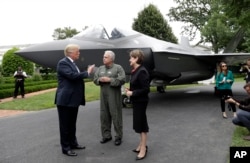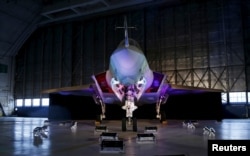Taiwan is upgrading a fleet of American-made fighter jets, but may scrap ambitions to acquire the more advanced F-35 models, showing the limits of U.S.-Taiwan military cooperation despite a common interest of resisting China.
The Air Force should get its first four upgraded F-16 A/B fighter jets in early 2019. The upgrades are part of a broader overhaul that began a year ago to convert the planes into the equivalent of higher-end F-16Vs, the government-funded Central News Agency said.
But the Taiwanese armed forces, ranked as the world’s 24th strongest, probably won’t get F-35 planes from the American developer Lockheed Martin despite expressions of interest in the past, defense analysts say.
Taiwan would then rely in any war with China, a military rival of some 70 years, on tactical advantages rather than trying to match its firepower.
“One main thing I think that Taiwan has sort of come to the realization that the talk of F-35s is more likely to be a long-ranging solution, more so than being able to get them on an immediate basis, so they have been toying around with various other options,” said Collin Koh, a maritime security research fellow at Nanyang Technological University in Singapore.
China claims self-ruled Taiwan as part of its own territory. Last week Chinese President Xi Jinping reiterated in a speech that his government could use force against the island 160 kilometers away if needed to force unification of the two sides. China maintains the third strongest military after the United States and Russia.
F-35 advantage
Taiwan needs better aircraft to replace the French-designed Mirage 2000 jets that it has used for about 25 years, said Andrew Yang, former defense minister and secretary-general of the Chinese Council of Advanced Policy Studies think tank.
Taiwan’s defense ministry technically has not ruled out F-35s, ministry spokesman Chen Chung-chi said Thursday. But he said the ministry was also weighing purchases or upgrades of other F-series aircraft that would “be in accord” with air defense goals.
“Those are all choices,” Chen said. “We have a lot of general considerations to factor in. We will do some appraisals and research.”
F-35s would help Taiwan with “peacetime interdiction” against China, said David An, senior research fellow with the policy incubator Global Taiwan Institute in Washington. The planes could “go out and identify and escort (Chinese) aircraft to make sure they don’t veer into Taiwan’s airspace,” he said.
China has flown military aircraft just outside Taiwan’s air defense zone 10 or 15 times since 2015. Leaders in Beijing now resent Taiwan President Tsai Ing-wen for rejecting a dialogue condition that each side sees itself as part of a single China.
F-35s would “play a unique role” in improving Taiwan’s overall military capabilities, An added. The aircraft, used now by Asian neighbors Japan and South Korea, would form a sky-based command and control hub to coordinate the operations of other military platforms, he said.
Informal rejection of F-35 sales
Taiwan has expressed “informal” interest in buying F-35s, An said. The U.S. government would need to approve the request before Lockheed Martin could make a sale. The U.S. government has informally rejected the idea, scholars believe.
“I think that was a political decision, and commercially it would be too late to meet with the timetable for replacement (of Mirage 2000s),” Yang said.
U.S. officials may worry that Chinese spies would steal F-35 technology from any aircraft sold to Taiwan, Koh said. They might also wonder whether Taiwan can afford the aircraft given its approximately $10 billion defense budget, compared to $500 billion for military spending in the United States, An said.
Officials in Washington may also fear F-35s could not fight off Chinese missiles, he said.
“The U.S. government recommendations for Taiwan are in favor of asymmetric capabilities such as cheap short-range coastal defense missiles to counter amphibious invasion, rather than symmetric capabilities such as expensive advanced fighter aircraft,” he said.
Upgrades in the short term
For now, Taiwan is spending $3.64 billion on upgrades of its existing 144 F-16 A/B jets. Central News Agency calls the overhaul “the largest and most important upgrade ever undertaken by the Air Force.” Lockheed Martin has sent engineers to Taiwan for the project.
Among their new hardware, the jets will receive advanced radar systems equivalent to those used by F-35 fighters.
The upgrades line up with the Taiwan president’s broader modernization of defense systems, including stronger preparations for cyber-warfare and more reliance on domestically developed weaponry.






